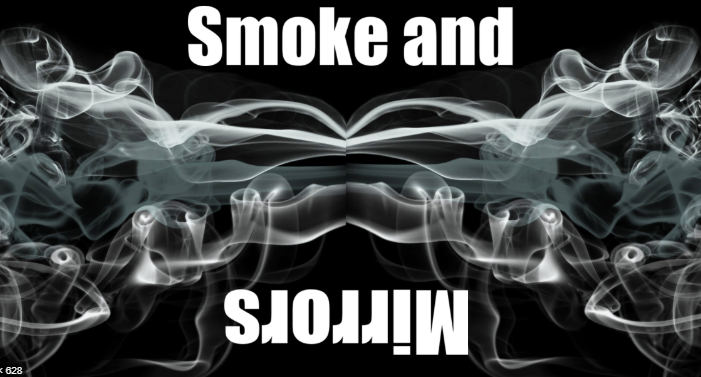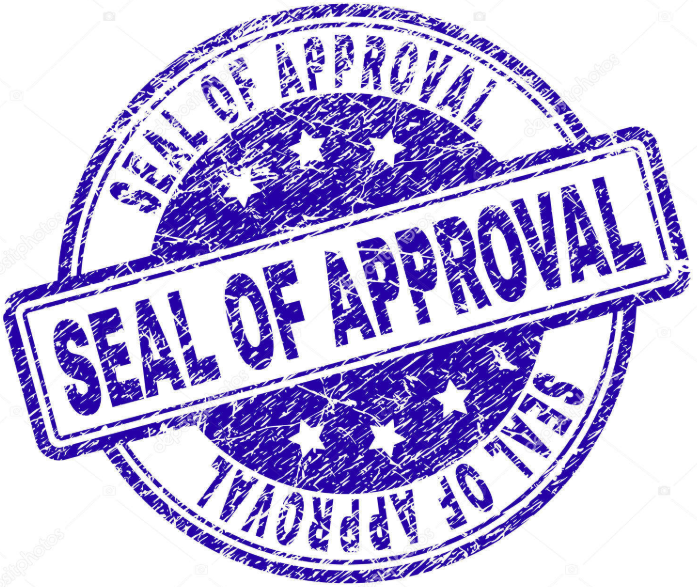10 Health and Safety Myths – #5 Safety Audits – Smoke and Mirrors
Before anyone gets upset…
 It’s OK, safety audits aren’t the myth. The myth is that they achieve something constructive. In the right context, safety audits can be a useful, if not essential part of a well-managed safety system. Unfortunately, in my experience safety audits are mostly seen as a huge mountain to climb just to “get a badge”. And it’s no different anywhere else in the world from what I’ve read.
It’s OK, safety audits aren’t the myth. The myth is that they achieve something constructive. In the right context, safety audits can be a useful, if not essential part of a well-managed safety system. Unfortunately, in my experience safety audits are mostly seen as a huge mountain to climb just to “get a badge”. And it’s no different anywhere else in the world from what I’ve read.
I’ve completed around 500 safety audits. And of various types. From those where the employer wants the badge, or needs to renew the badge, to those where they want to run the ruler over their system to calibrate their compass.
The latter type of audit is by far the most constructive type of safety audit. The employer initiated it; the audit tool is put together to include local specifics; it’s not an official audit with “club membership” at stake. And they are eager and ready to know where the gaps are.
For that type of audit, I include a physical inspection as well as the systems and administration stuff. The physical inspection gives the client very practical advice they can use today. And it also means I can create what is often their first Hazard/Risk Register. Or at least, the first that has nice, simple specifics instead of a generalised wish-list. This gives credit for the good things they are doing as well as improvements needed. That’s a constructive, non-threatening type of audit. See details of services below if you are interested.
So when are safety audits not constructive?
When it comes to “get the badge” audits, it’s about getting enough pieces of paper together to pass. No really. It is. So pick from the following indicators:
- “Are we really the standard bearer for the whole company today?” Yup.
- “Head Office Murray” has been staying at the local motel and “has been here to help”. A desk in the corner causing daily disruption. For the last 4 weeks. The receptionist got flustered when the auditor arrived. People are whispering.
- The noticeboard is crammed with crisp new sheets of paper. In fact, waaait a minute! They’re still warm.
- The site safety person is looking disorientated, while “Head Office Murray” wants to lead the audit. He keeps sliding a piece of paper under the auditor’s nose before the next question. Documents are arranged in order of appearance in a big ring-binder.
- The boss is polite and pokes his or her head in. It’s like a train wreck to watch. In 30 seconds flat, by gibbering out naïve platitudes, they demonstrate beyond all doubt to the auditor what the auditor already knew – that management here are away with the fairies. (Better to remain silent and be thought a fool than to speak and remove all doubt).
- As the audit progresses, the auditor realises every time they ask an awkward question, there is frosty silence. Then, a bit of in-fighting might develop. Yup, it’s going to be a long day.
That is a generalisation. But from my experience with safety audits, where there’s something at stake, 80-90% of safety audits have some elements of the above. Maybe all of them. For a safety audit, that’s a bad environment. Fear of failure, excessive reliance on bits of paper, a tick-box approach and basically, a con job. So who benefits if they get away with it?
Some anecdotal audit experiences from desperate people
- A freshly sacked/disgruntled/vengeful OHS Manager of a large retail corporation who called me as I was driving to the audit and told me I was going to get a snow-job done on me. Because the employer had been faking documents for the audit. All a bit sad.
- The GM of an organisation who resentfully dressed me down and said that failure to get the badge was the end of her Christmas Bonus. Oh dear, what a pity, never mind.
 The organisation that presented me with two crisp and unsoiled evacuation drill records written with the same pen, same handwriting, exactly 6 months apart. Tricky! Then I noticed the document control details in the footer showed the template was first created last week. Months after the supposed drills had occurred. Ping!
The organisation that presented me with two crisp and unsoiled evacuation drill records written with the same pen, same handwriting, exactly 6 months apart. Tricky! Then I noticed the document control details in the footer showed the template was first created last week. Months after the supposed drills had occurred. Ping!- The Director (co-owner) of a company renewing their accreditation had a very competent assistant looking after health and safety. But the Director was intent on dominating the audit. She became intensely overbearing and offensive. So I paused the audit and told her politely as she was not helping. She refused to stop ranting. Fortunately, she had to go out to another appointment and the smart assistant and I got on with an easy audit. (The Director returned in battle mode just as I was leaving and demanded to know the result. I said all was well and “thank you for your hospitality”).
- The Safety Guy who told me I was pedantic when he had no detectable processes, procedures or activities at all for contractor safety. Zero. None. Just bland words that came out of his mouth. Yep, under those circumstances, having exhausted all avenues and finding words hollow and empty, I get to be as “pedantic” as I like, buddy.
What about those horrible auditors?
Auditors can be pretty awful. And I say the worst type of auditor is a weak one. Because the next auditor is really messed up if the previous one just didn’t have the balls. Bad look for everyone concerned and bloody hard work.
I’m sure there must be some downright irritating, fussy or aggressive auditors but my feeling is that’s a bit of a myth. It’s usually a case of “righteous indignation”. Because all audits where there was a disappointment for the Home Team gets labelled a “Bad Audit”. It’s never because the auditor saw through their game of smoke and mirrors. Most auditors want to help and be flexible. But only until they get tired of the weasel words.
Here are a few observations/solutions/check questions:
 Does the organisation or specific location want the audit so they can learn from it, or just because they must get the badge?
Does the organisation or specific location want the audit so they can learn from it, or just because they must get the badge?- Have you kicked a whole lot of things into a pile hurriedly in the last few weeks? Trust me, the auditor will know and that leads directly to a struggle.
- Please don’t lie to an auditor. Not even slightly. They really don’t like it for some strange reason and the questioning will just get harder. Instead, be open that you are aware of some shortcomings and show them what you are doing about it.
- Has there been any form of internal audit in the last (say) 12 months? No? Then that’s why you are now looking like a crash-test dummy.
- Is there a safety system genuinely in place? And do site people know what it is? An audit is not the place to find people are drowning in the deep end.
- All audits, to a greater or lesser extent should be an opportunity for constructive learning. Don’t get in the way of that.
- Are the audit criteria so generic that they don’t take into account local/contextual or unique characteristics? Show how you are different, or maybe achieve the required result in innovative ways.
- Wouldn’t it be nice if an audit could spend some time on “what we don’t know” instead of asking only about things that are pre-determined standards? Talk to the auditor about your successes. Find a way. They may need help to get off their dull script.
- Some experts have an opinion that audits should be all about “finding things that are wrong”. Would this cause more anxiety and cheating? Perhaps not if everyone knew it and expected it. Could even be a lively learning experience.
- If you get a “good” audit report, should good leaders (managers) challenge that instead of resting on their laurels?
Here are four publications that I found of interest
- Health and Safety Audit e-book: RoSPA (undated).
- Auditing Health and Safety Management Systems: A Regulator’s View: Health & Safety Executive Operations Unit, UK. (1999).
- OSH Auditing – Reality Check: IOSH Magazine: (April 2017).
- Who’s Handling Your Safety Audits? Internal vs. External: RoSPA. (March 2013).
Contact me if I can help you with any safety stuff. Call 0800 000 267 for a welcoming chat, or email simon@safetypro.co.nz
- Simon Lawrence is Director of SafetyPro Limited.
- Consulting for safety: Safety Advice, Problem Solving, Audits and Training
- Call 0800 000 267 for a welcoming chat, or email simon@safetypro.co.nz
My 10 Health & Safety Myths. Planned topics and dates.
-
- # 1: Passion for Safety – Please no! 29 August 2019
- #2 Lost Time Injury Rates – Dark Arts in the Boardroom. 18 September 2019
- #3 Zero Harm – Stop Taking it Literally! 9 October 2019
- #4 We Have a Safety Culture – Yeah. Nah! 30 October 2019
- #5 Safety Audits – Smoke and Mirrors 20 November 2019
- #6 Safety Manuals – You’d Think it Would be Simple 31 January 2019
- #7 Safety Policy Statements – You Are Committed to What? 21 February 2020
- #8 The Hazard Register – What Is It Really For? 7 August 2020
- #9 Accident Investigation – Tick & Flick 28 August 2020
- #10 Contractor Management – The Thin Paper Wall 18 September 2020
Check out our SafetyBase software
- View a 4 minute video overview. Please like or share.
- Browse the SafetyBase website.
- Short cut to the all-important Pricing Page. No hidden costs.
- Download a PDF Fact Sheet to show to your Senior Leadership Team.
Call me, Simon, on 0800 000 267 or email simon@safetypro.co.nz You could be trying out this highly effective health and safety software system in minutes

